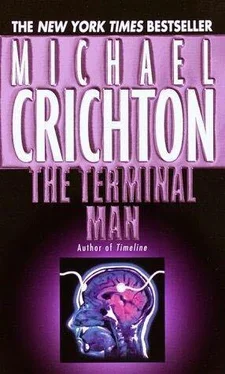Michael Crichton - The Terminal Man
Здесь есть возможность читать онлайн «Michael Crichton - The Terminal Man» весь текст электронной книги совершенно бесплатно (целиком полную версию без сокращений). В некоторых случаях можно слушать аудио, скачать через торрент в формате fb2 и присутствует краткое содержание. Жанр: Фантастика и фэнтези, на английском языке. Описание произведения, (предисловие) а так же отзывы посетителей доступны на портале библиотеки ЛибКат.
- Название:The Terminal Man
- Автор:
- Жанр:
- Год:неизвестен
- ISBN:нет данных
- Рейтинг книги:3 / 5. Голосов: 1
-
Избранное:Добавить в избранное
- Отзывы:
-
Ваша оценка:
- 60
- 1
- 2
- 3
- 4
- 5
The Terminal Man: краткое содержание, описание и аннотация
Предлагаем к чтению аннотацию, описание, краткое содержание или предисловие (зависит от того, что написал сам автор книги «The Terminal Man»). Если вы не нашли необходимую информацию о книге — напишите в комментариях, мы постараемся отыскать её.
The Terminal Man — читать онлайн бесплатно полную книгу (весь текст) целиком
Ниже представлен текст книги, разбитый по страницам. Система сохранения места последней прочитанной страницы, позволяет с удобством читать онлайн бесплатно книгу «The Terminal Man», без необходимости каждый раз заново искать на чём Вы остановились. Поставьте закладку, и сможете в любой момент перейти на страницу, на которой закончили чтение.
Интервал:
Закладка:
She ignored them; the numbers, she knew, were just the computer's scratch pad, the intermediate steps that it went through before arriving at a final answer. She smiled, thinking of how Gerhard would explain it - rotation of thirty by thirty matrices in space, deriving factors, making them orthogonal, then weighting them. It all sounded complicated and scientific, and she didn't really understand any of it.
She had discovered long ago that you could use a computer without understanding how it worked. Just as you could use an automobile, a vacuum cleaner - or your own brain.
The screen flashed "CALCULATIONS ENDED. CALL DISPLAY SEQUENCE."
She punched in the display sequence for three-space scoring. The computer informed her that three spaces accounted for eighty-one percent of variance. On the screen she saw a three-dimensional image of a mountain with a sharp peak. She stared at it a moment, then picked up the telephone and paged McPherson.
McPherson frowned at the screen. Ellis looked over his shoulder. Ross said, "Is it clear?"
"Perfectly," McPherson said. "When was it done?"
"Today," she said.
McPherson sighed. "You're not going to quit without a battle, are you?"
Instead of answering, she punched buttons and called up a second mountain peak, much lower. "Here's the last one previously."
"On this scoring, the elevation is- "
"Psychotic mentation," she said.
"So he's much more pronounced now," McPherson said. "Much more than even a month ago."
"Yes," she said.
"You think he was screwing around with the test?"
She shook her head. She punched in the four previous tests, in succession. The trend was clear: on each test the mountain peak got higher and sharper.
"Well, then," McPherson said, "he's definitely getting worse. I gather you still think we shouldn't operate."
"More than ever," she said. "He's unquestionably psychotic, and if you start putting wires in his head- "
"I know," McPherson said. "I know what you're saying."
"- he's going to feel that he's been turned into a machine," she said.
McPherson turned to Ellis. "Do you suppose we can knock this elevation down with thorazine?" Thorazine was a major tranquilizer. With some psychotics, it helped them to think more clearly.
"I think it's worth a try."
McPherson nodded. "I do, too. Janet?"
She stared at the screen and didn't reply. It was odd how these tests worked. The mountain peaks were an abstraction, a mathematical representation of an emotional state. They weren't a real characteristic of a person, like fingers or toes, or height or weight.
"Janet? What do you think?" McPherson repeated.
"I think," she said, "that you're both committed to this operation."
"And you still disapprove?"
"I don't 'disapprove.' I think it's unwise for Benson."
"What do you think about using thorazine?" McPherson persisted.
"It's a gamble."
"A gamble not worth taking."
"Maybe it's worth it, and maybe it's not. But it's a gamble."
McPherson nodded and turned to Ellis. "Do you still want to do him?"
"Yes," Ellis said, staring at the screen. "I still want to do him."
As always, Morris found it strange to play tennis on the hospital court. The hospital buildings looming high above him always made him feel slightly guilty - all those rows of windows, all those patients who could not do what he was doing. Then there was the sound. Or, rather, the absence of sound. The freeway ran near the hospital, and the reassuring thwock! of the tennis balls was completely obliterated by the steady, monotonous rush of passing cars.
It was getting dark now, and he was having trouble with his vision; the ball seemed to pop unexpectedly into his court. Kelso was much less hampered. Morris often joked that Kelso ate too many carrots, but whatever the explanation, it was humiliating to play late with Kelso. Darkness helped him. And Morris hated to lose.
He had long ago become comfortable with the fact of his own competitiveness. Morris never stopped competing. He competed in games, he competed in work, he competed with women. More than once Ross had pointed that out to him, and then dropped the subject in the sly way that psychiatrists raise a point, then drop it. Morris didn't mind. It was a fact of his life, and whatever the connotations - deep insecurity, a need to prove himself, a feeling of inferiority - he didn't worry about it. He drew pleasure from competition and satisfaction from winning. And so far in his life he had managed to win more often than not.
In part, he had joined the NPS because the challenges were very great and because the potential rewards were enormous. Privately, Morris expected to be a professor of surgery before he was forty. His past career had been outstanding- that was why Ellis had accepted him - and he was equally confident about his future. It wouldn't hurt to be associated with a major landmark in surgical practice.
All in all, he was in a good mood, and he played hard for half an hour, until he was tired and it was too dark to see. He signaled to Kelso - no point in calling above the freeway sounds - to end the game. They met at the net and shook hands. Morris was reassured to see that Kelso was sweating heavily.
"Good game," Kelso said. "Tomorrow, same time?"
"I'm not sure," Morris said.
Kelso paused. "Oh," he said. "That's right. You have a big day tomorrow."
"Big day," Morris nodded. Christ, had the news even reached the pediatric residents? For a moment he felt what Ellis must be feeling - the intense pressure, abstract, vague, that came from knowing that the entire University Hospital staff was watching this procedure.
"Well, good luck with it," Kelso said.
As the two men walked back to the hospital, Morris saw Ellis, a distant solitary figure, limping slightly as he crossed the parking lot and climbed into his car, and drove home.
Wednesday, March 10, 1971: Implantation
At 6 a.m. Janet Ross was on the third surgical floor, dressed in greens, having coffee and a doughnut. The surgeons' lounge was busy at this hour. Although operations were scheduled to begin at six, most didn't get going for fifteen or twenty minutes after that. The surgeons sat around, reading the newspaper, discussing the stock market and their golf games. From time to time one of them would leave, go to the overhead viewing galleries, and look down on their ORs to see how preparations were coming.
She was the only woman in the room, and her presence changed the masculine atmosphere subtly. It annoyed her that she should be the only woman, and it annoyed her that the men should become quieter, more polite, less jovial and raucous. She didn't give a damn if they were raucous, and she resented being made to feel like an intruder. It seemed to her that she had been an intruder all her life, even when she was very young. Her father had been a surgeon who never bothered to conceal his disappointment and irritation that he had a daughter instead of a son. A son would have fitted into his scheme of life; he could have brought him to the hospital on Saturday mornings, taken him into the operating rooms - those were all things you could do with a son. But a daughter was something else, a perplexing entity not suited for a surgical life. And therefore an intrusion…
She looked around at all the surgeons in the lounge, and then, to cover her unease, she went to the phone and dialed the seventh floor.
"This is Dr. Ross. Is Mr. Benson on call?"
"He was just sent."
"When did he leave the floor?"
"About five minutes ago."
She hung up and went back to her coffee. Ellis appeared and waved to her across the room. "There'll be a five-minute delay hooking into the computer," he said. "They're tying in the lines now. Is the patient on call?"
Читать дальшеИнтервал:
Закладка:
Похожие книги на «The Terminal Man»
Представляем Вашему вниманию похожие книги на «The Terminal Man» списком для выбора. Мы отобрали схожую по названию и смыслу литературу в надежде предоставить читателям больше вариантов отыскать новые, интересные, ещё непрочитанные произведения.
Обсуждение, отзывы о книге «The Terminal Man» и просто собственные мнения читателей. Оставьте ваши комментарии, напишите, что Вы думаете о произведении, его смысле или главных героях. Укажите что конкретно понравилось, а что нет, и почему Вы так считаете.









